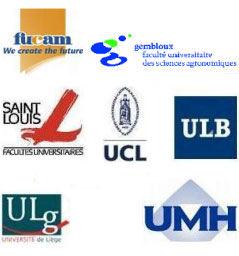Call for Papers
International Conference on
“Resistances:
Between Theories and the Field”
14th
and 15th of December 2016
Center for the Study of International
Cooperation and Development
(CECID – Centre d’Etude de la Coopération
Internationale et du Développement),
Université Libre de Bruxelles (ULB),
Belgium
Deadline for the submission of abstracts (in
English or French):
15
th of October 2016
Confirmed Keynote speakers:
James
C. Scott (Yale University)
Stellan
Vinthagen (UMass, Amherst)
Rationale:
This conference is
intended to stir an international debate on the concept and understanding of
“resistance” in its various meanings. In
this respect, the use
of the word resistance in its plural form for the title of this conference is
not incidental. It emphasizes our will to explore the complexity and
multi-faceted forms, locations, aims, and outcomes inherent to the concept of
resistance. We see resistance(s) not only as a concept that can be engaged with
from various angles. It is also an approach that can help a dialogue between
academia and other sectors, a thing that this conference seeks to explore in
broad temporal and geographical perspectives.
From mass public protests during the Arab
Springs and the Indignados and Occupy movements, to individual disobedience
from whistle blowers (Assange, Snowden), resistance (to domination, oppression,
or simply mainstream political power) has been manifesting itself in a variety
of modes. This newly available empirical evidence rapidly generated numerous,
rich accounts and encountered studies of social movements and contentious
politics. What have remained largely understudied are the accounts of
non-politicised or non-overtly politicised movements, the transformation of
informal resistance into movements, their politicisation, and the relationship
between informal resistance and political change.
Some recent works have, however, addressed this
lack in the field (see, for instance, Chenoweth and Stephan, Why Civil Resistance Works, Schock, Civil
Resistance Today,
Vinthagen, A Theory of Nonviolent Action:
How Civil Resistance Works). We would thus like to encourage emerging
research on this subject.
We welcome empirically-grounded case studies as
well as theoretical (and/or) epistemological reflections on topics related (but
not limited) to:
-
Silent
and “loud” resistances as case study (nonviolent, violent, public and hidden,
individual or collective…)
-
Resistance
and social change
-
Informal
networks, practices, and their significance in policy making
-
Globalised
vs localised resistance
-
Vulnerability
and resistance (gender, minorities, marginalised communities)
-
Economic
or financial resistance
-
Everyday
struggle and resistance vs more organised and long-term forms of resistance
-
Methodological
approaches and consideration for the study of resistance
-
Ethics
and resistance (how to deal with the publication of cases where resistance is
secret, or needs to escape the radar of authorities)
We are keen to promote an interdisciplinary
reflection on the concept of resistance and a broad theoretical and
methodological understanding of the issue. Accordingly, we would like to open participation to activists
who would like to present an analytical reflection based on their work.
In addition, willing to challenge past and
present understandings of the concept, and to bring about new perspectives, we
welcome contributions from both experienced and early career researchers.
Practical information:
If interested send a 3-500 word abstract (in
English or French) by the 15th
of October 2016 to resistancesULB@gmail.com including a short biographical statement.
Applicants will be notified by the 5th of November
about their acceptance.
We might be able to provide some financial
support to researchers (especially early career researchers) who have no
sponsorship from their own institute. We can't guarantee full sponsorship for
everyone but we will try to offer a contribution in the region of 250 EUR for
participants from Europe and 500 for participants from outside of Europe. If
you would like to be considered please mention, below your abstract, what kind
of support you would need (travel, accommodation, etc.).
About our Keynote Speakers:
· James C. Scott:
James C. Scott challenged traditional
understandings of resistance by analyzing
everyday forms of resistance and conceptualizing of “infrapolitics” (see, Weapons of the Week, 1985, Domination and the Art of Resistance, 1991).
His research concerns
political economy, comparative agrarian societies, theories of hegemony and
resistance, peasant politics, revolution, Southeast Asia, theories of class
relations and anarchism.
His recent publications include Seeing Like a State:
How Certain Schemes to Improve the Human Condition
Have Failed (1997), and The Art of Not Being Governed: An Anarchist History
of Upland Southeast Asia (2009).
He will be presenting results and reflections from his latest research.
· Stellan Vinthagen:
Stellan Vinthagen is the
Inaugural Endowed Chair in the Study of Nonviolent Direct Action and
Civil Resistance at The University of Massachusetts,
Amherst. He is also a researcher in his native Sweden at The Department of
Social and Behavioral Studies, University West, and at The School of Global
Studies, University of Gothenburg, where he is leading the Resistance
Studies Program. Vinthagen researches resistance, power, social movements,
nonviolent action and social change. His latest publications include A
Theory of Nonviolent Action – How Civil Resistance Works (2015).
Having been active in many different social movements since 1980
(environmental, migrant rights, anti-arms trade, peace, Palestine solidarity,
etc.), he has participated in more than 30 nonviolent civil disobedience
actions. He has been an educator, organizer and activist in several countries,
and will be presenting his intake on nonviolent resistance and its ability to
bring about social change.
